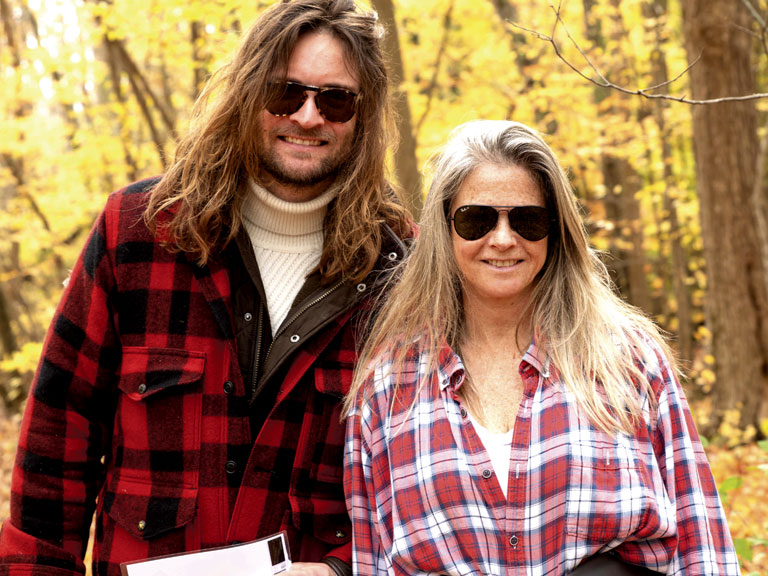County News
Regenerative

Proposed boutique hotel and spa causes concern for some
There may have been nearly four hours of discussion, but many were left with more questions than answers after last Wednesday’s County Planning meeting. IRTH Landscape Hotel and Spa was the main topic of discussion, having 23 comments from the public—19 of which were in opposition. The development, which is to be located on Rock Cross Road in North Marysburgh, sits on 79 acres and backs onto the Lost Lake basin, which is a recognized as a Provincial Area of Natural and Scientific Interest. An Official Plan amendment and zoning bylaw amendment for the property are being considered, which would then see a fourseason, year-round hotel with 12 forest rooms and 12 off-grid cabins, welcome 48 daily guests.The development intends to have an operational goal of being completely regenerative and net positive.
Landscape preservation and restoration is central to this project. The hotel itself will be built in an area fairly near the road that already shows significant signs of human intervention, in order to conserve the more natural areas. Meadows that have lain fallow for years and are now overrun by invasive species, such as wild parsnip and dog-strangling vine will be remediated, a process that is already underway. One meadow will be planted with native grasses and wildflowers, and there are plans to plant over 10,000 trees over the next few years. Just wo weeks ago, the first of these trees were planted in the third field, with another 700 mature native trees scheduled for planting this fall along the property line by the vineyard. The marsh area will be allowed to regenerate naturally, with the help of a resident beaver colony, although the water level will be controlled through a silent drainage system. The outdoor spa area, which is arranged as a walking circuit in the forest adjacent to the hotel and comprises hot pools, relax spaces, sauna and treatment rooms, will be constructed using natural materials, and is designed to blend in to the natural landscape. The signature offering of the facility will be guided forest therapy walks, led by co-founder Melanie Hazell.
Marko Cekic, a land use planner for IRTH spoke to the newest Official Plan (OP) adopted by council earlier this year, stating council should be basing its decision off of the current OP, not the one not yet approved by the province. “Since the OP Amendment and zoning bylaw amendment applications were deemed completed prior to the approval of the 2021 OP, the application should be evaluated based on the OP in force and in effect at the time they were deemed complete,” he said. “It is clear the 2021 OP echoes this thought as it provides an application submitted and deemed complete before July 6, 2021 and should be reviewed under the existing 2006 OP.”
The comments in favour were few and far between. Jeff Andeeson thought that the environmentally responsible plan of IRTH should be commended. “It’s not just about bringing new business into the County, it is about bringing new business into the County in an environmentally responsible way,” said Andeeson, who also said the site, which is being described as pristine, is definitely not. “There was invasive species everywhere. There are ATV trails and refuse from partying.”
Renata Claudie, a biologist also noted that the land in its current state was not pristine. “It is picturesque, but it has been used for agriculture and has been left fallow. One of the wood lots was left fragmented, a road has been cut into escarpment, and there has been some excavation of gravel,” said Claudie. “The IRTH project is a really good alternative for a very nice piece of land which I think could support really wide biodiversity and also be there for the species-at- risk.”

Alex Daprato and Melanie Hazell are two of the co-founders of IRTH and are seen here in the hardwood forest on the property.
In its presentation, IRTH said that some of the inspiration came from the Fogo Island Inn, located in Newfoundland. Fogo Island Inn sits on an island, with 29 one-of-a-kind guest rooms. The award-winning Inn is built on the principles of sustainability and respect for nature and culture. The Inn is a community asset, and 100 per cent of operating surpluses are reinvested into the community to help secure a sustainable and resilient future for Fogo Island. Councillor Bill Roberts asked which of the Fogo Island Inn attributes IRTH is inspired by and which would be measurable contributions to the economy. “One of the things we are fighting here is the growing disparity between the wealthy and the less wealthy. Fogo Island Inn’s commitment is to make sure that 49 per cent of their gross revenue is alotted to local employees for their salaries and their benefits.Which attributes can look forward to as being measurable contributions to our economy, our heritage in a way that sees IRTH as a community asset?” he asked.
Hazell noted that a hotel can be a lot more than a hotel, but did say that IRTH was inspired by Fogo Island Inn and not identical. “We were very inspired by the economic label they have come up with. The transparency on where the money goes. We are committed to doing that with the restoration label. Our business model is quite different, but we do hope to stimulate local partnerships, to source locally as much as we can. We are part of a community and we want to contribute to that community however we can,” said Hazell.
Sheila Kuja spoke on behalf of Prince Edward County Field Naturalists. “The current proposed Official Plan Ammendment does not conform with the vision for Prince Edward County and clearly is not in favour of designating lands designated as Environmental Protection zone, wetlands, significant Great Lakes coastal, and possibly provincially significant, and ANSIs, especially in a location that will soon be recognized as part of the Cape Vessey core area in the new OP,” stated Kuja. “The location of this project at this site is incompatible with sustaining the biodiversity of this remarkable environmentally sensitive property.”
Les Stanfield believes that the risk to existing water users, by their wells becoming dry or contaminated, is too great to allow the project to move forward. “The deck of cards rationalization that the development can proceed because hydrologic studies were completed is seriously flawed. Poor studies bring poor decisions,” he said. Hazell noted water requirements have been reduced from 24,000 litres to below 10,000 litres per day, because the guest capacity has also shrunk from 120 per day to 48.
Kristen Rogers, co-owner of Cape Vineyards which backs onto the IRTH property, said that the winery’s future is uncertain, even after investing millions of dollars in the business. “This development may well end our farm livelihood and threatens our ability to expand our operations,” she said. “There is a direct risk of contaminated water supply and septic leaching onto our vineyard.It is demonstratably incompatible to have a luxury destination outdoor space and resort beside a farm,” she said.
Councillor John Hirsch said more questions have been raised, than answered, but that there is still time to have them answered. “I would note for council and for the public that the motion we’re approving this evening instead says it requires the completion of a planning analysis by staff. That’s different than the usual position. I think that’s for good reason because I really believe there are a number of questions that need to be resolved before staff can legitimately come to a recommendation.”
Ultimately, Hazell believes Prince Edward County is the perfect location for the project. “Given the nature fix experience we were offering, Ontario still lags behind on that front,” said Hazell. “We also felt that the County, given the recent evidence of the whole creative and artistic community that is emerging, would be a perfect fit. We wanted a community that has vibrance. A community that might be looking for the next kind of tourism.”
The Planning Committee voted unanimously to receive the information and to have staff complete the planning analysis to bring the matter back to council at a later date.

Sounds like an amazing and beautiful place.
Change and growth in the County is inevitable, and trying to stop it, foolish. Managed growth with environment friendly, thoughtful projects like this is the way to go.
Much more upside than expanding the Picton Terminals.
make a large donation to the hospital and the mayor will say yes, if Qunite Isle can do it anyone can…
What happens to the land if the Irth project does not go forward?
Does it go back to agriculture? Which it is zoned to do? How would that be better?
Interesting and creative business idea. It is truly great to see the entrepreneurial spirit in the next generation of County residents .
WOW! I wonder who wrote this very pro Irth article? With 19 public comments opposed and only 4 pro, the majority of the 4 either close friends of the proponents or on Irth’s payroll…this is a very unbalanced article indeed.
This county is not built to handle all this people, ie parking, road repair, even the stores are to small, this county needs to stop all this building, water and sewer will become a real problem if it’s not already. And if this dose go throw we’re should all the staff live, we don’t have housing now, what will happen when the wild live go for a swim in the nice pool, it just don’t mix